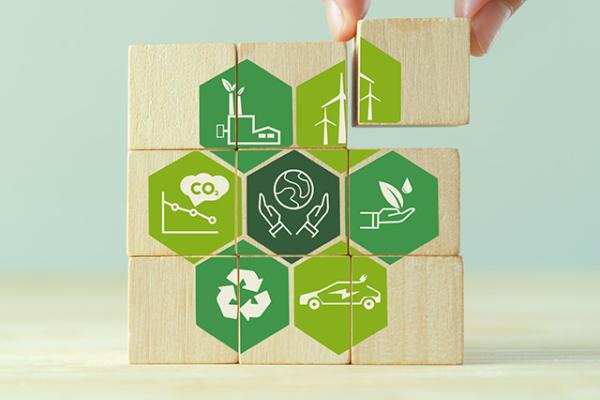What is sustainable finance?
Sustainable finance refers to the process of taking environmental, social and governance (ESG) considerations into account when making investment decisions in the financial sector, leading to more long-term investments in sustainable economic activities and projects. Environmental considerations might include climate change mitigation and adaptation, as well as the environment more broadly, for instance the preservation of biodiversity, pollution prevention and the circular economy. Social considerations could refer to issues of inequality, inclusiveness, labour relations, investment in people and their skills and communities, as well as human rights issues. The governance of public and private institutions – including management structures, employee relations and executive remuneration – plays a fundamental role in ensuring the inclusion of social and environmental considerations in the decision-making process.
In the EU's policy context, sustainable finance is understood as finance to support economic growth while reducing pressures on the environment to help reach the climate- and environmental objectives of the European Green Deal, taking into account social and governance aspects. Sustainable finance also encompasses transparency when it comes to risks related to ESG factors that may have an impact on the financial system, and the mitigation of such risks through the appropriate governance of financial and corporate actors.
Why is sustainable finance important?
Sustainable finance has a key role to play in delivering on the policy objectives under the European green deal as well as the EU’s international commitments on climate and sustainability objectives. It does this by channelling private investment into the transition to a climate-neutral, climate-resilient, resource-efficient and fair economy, as a complement to public money. Sustainable finance will help ensure that investments support a resilient economy and a sustainable recovery from the impact of the COVID-19 pandemic.
The European Union strongly supports the transition to a low-carbon, more resource-efficient and sustainable economy and has been at the forefront of efforts to build a financial system that supports sustainable growth.
What is transition finance?
Sustainable finance is about financing both what is already environment-friendly today (green finance) and what is transitioning to environment-friendly performance levels over time (transition finance). Transition finance is about financing private investments to reduce today’s high greenhouse gas emissions or other environmental impacts and transition to a climate neutral and sustainable economy. For instance, these could be investments in green production methods or reducing the environmental footprint as far as possible, where no green technologies are yet available. Transition finance is urgently needed to reduce greenhouse gas emissions by 55% and our environmental impact by 2030. It is often needed by companies that want to become sustainable but need to do so in steps over time - in other words, companies with different starting points that want to finance their journey towards a sustainable future.
On 13 June 2023, the Commission issued non-binding recommendations on how non-financial and financial companies can voluntarily use EU sustainable finance tools to seek or provide transition finance. The EU’s sustainable finance toolbox not only supports companies with the highest sustainability records, but also companies with different starting points that have clear sustainability targets. It also allows smaller companies to raise finance for their transition in a proportionate way.
In 2015, landmark international agreements were concluded with the adoption of the UN 2030 agenda and sustainable development goals and the Paris climate agreement. The Paris climate agreement, in particular, includes the commitment to align financial flows with a pathway towards low-carbon and climate-resilient development.
On 11 December 2019, the Commission presented the European green deal, a growth strategy with the aim of making Europe the first climate-neutral continent by 2050.
As part of the green deal, the Commission presented on 14 January 2020 the European green deal investment plan, which will mobilise at least €1 trillion of sustainable investments over the next decade. It will create the right environment – or ‘enabling framework’ – to facilitate and stimulate the public and private investments needed for the transition to a climate-neutral, green, competitive and inclusive economy.
The Commission presented on 17 September 2020 its 2030 climate target plan, with an increased emissions reduction target of 55% by 2030 as compared to 1990. The EU needs to invest approximately € 350 billion more every year during the 2021-30 decade than it did during the previous decade, in order to meet these 2030 climate and energy targets. The EU is already providing impetus to help attract the required investments with the European Fund for Strategic Investments and other initiatives. However, the scale of the investment challenge is beyond the capacity of the public sector alone. The financial sector has a key role to play in reaching those goals. It can
- re-orient investments towards more sustainable technologies and businesses
- finance growth in a sustainable manner over the long-term
- contribute to the creation of a low-carbon, climate resilient and circular economy
To this end, the Commission has since 2018 been developing a comprehensive policy agenda on sustainable finance, comprising the action plan on financing sustainable growth and the development of a renewed sustainable finance strategy in the framework of the European green deal and the new strategy for financing the transition to a sustainable economy. The Commission is also coordinating international efforts through its International platform on sustainable finance.
Policy making timeline
- 22 March 2024Study - Biodiversity
- 5 February 2024Legislation - ESG ratings
- 13 June 2023Legislative package – Sustainable finance
The Commission publishes the sustainable finance package of measures that builds on and strengthens the foundations of the EU sustainable finance agenda.
- 27 August 2021Study - ESG factors into the EU banking prudential framework
- 6 July 2021Strategy - Sustainable finance
The Commission publishes a strategy for financing the transition to a sustainable economy.
- 21 April 2021Legislative package - Sustainable finance
The Commission publishes the sustainable finance package of measures that should help improve the flow of money towards sustainable activities across the European Union.
- 1 October 2020Expert group - EU Platform on Sustainable Finance
The Commission publishes the list of members of the EU Platform on Sustainable Finance.
- 8 April 2020Consultation - Renewed sustainable finance strategy
The Commission launches a consultation on the renewed sustainable finance strategy.
End date: 15 July 2020 - 14 January 2020Publication - European Green Deal Investment Plan and Just Transition Mechanism
The Commission presents the European Green Deal Investment Plan and Just Transition Mechanism, which will mobilise at least €1 trillion of sustainable investments over the next decade and will enable a framework to facilitate public and private investments needed for the transition to a climate-neutral, green, competitive and inclusive economy.
- 10 December 2019Event - Financing the Paris Agreement
The Commission and the European Investment Bank (EIB) jointly organise the COP 25 joint high-level event: “Financing the Paris Agreement: how to mobilise private investors?”.
- 21 March 2019High-level conference: A global approach to sustainable finance
The Commission organises a High-level conference: A global approach to sustainable finance.
- 24 May 2018Legislative package - Sustainable finance
The Commission presents legislative proposals on sustainable finance.
- 8 March 2018Action plan - Financing sustainable growth
The Commission publishes its renewed sustainable finance strategy and implementation of the action plan on financing sustainable growth.
- 13 November 2017Consultation - Institutional investors and asset managers' duties regarding sustainability
The Commission launches a public consultation on institutional investors and asset managers' duties regarding sustainability
End date: 28 January 2018 - 18 July 2017Event - Sustainable finance
The Commission organises a public hearing on sustainable finance.
- 24 November 2016Study - Green bonds
Commission expert groups on sustainable finance
The Platform is an advisory body subject to the Commission’s horizontal rules for expert groups.
Further information on the MSEG is available on the European Commission Register of Commission Expert Groups and similar bodies.
The European Commission set up a Technical expert group on sustainable finance (TEG) to assist it in developing its sustainable finance work, in line with the Commission's legislative proposals of May 2018.
The European Commission established a High-level expert group on sustainable finance (HLEG) in December 2016.







